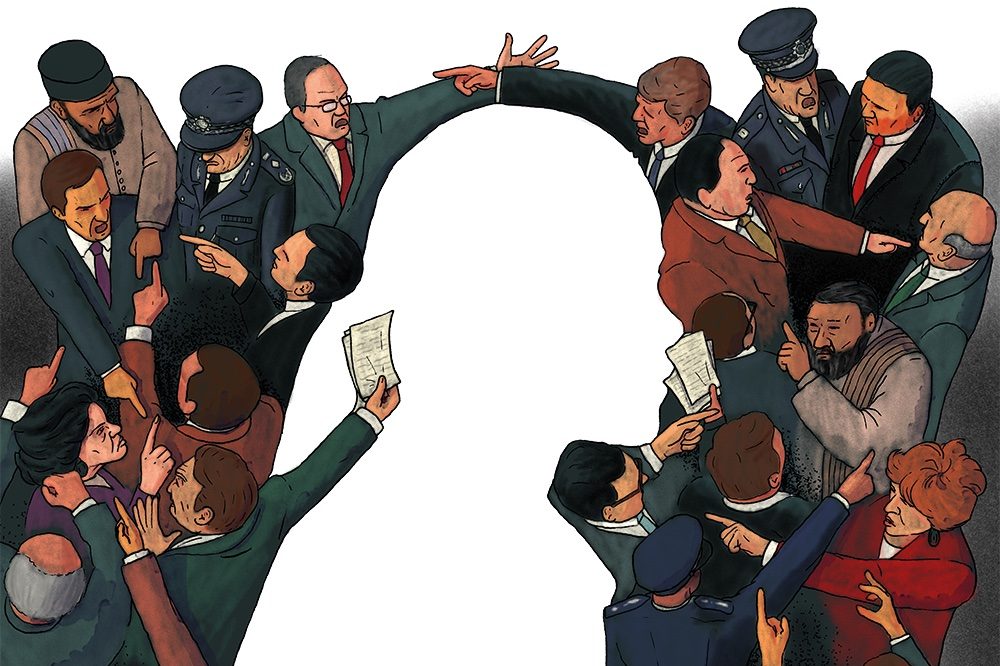It is always interesting to watch a dam burst. In the past week, as Elon Musk and other prominent Americans discovered the British “grooming gang” scandal, British politics has suddenly had to face up to something it has spent a quarter of a century trying to ignore. One would hope that the claim that thousands of underage girls had been gang-raped by thousands of men in cities across the country would be a subject of profound concern for our politicians. Who did this? Why? How can we help the victims and prevent any reoccurrence?
But no society asks questions to which it does not want an answer. The language used about this mass crime has been coyly euphemistic. Take “grooming.” Can you say that the girl in Oxford who was repeatedly drugged and raped by men who threatened to kill her and branded her buttocks with “M” for “Mohammed” was merely “groomed?”
And what of “Asian?” Did these towns see an outbreak of Japanese men prowling our cities for what former home secretary Jack Straw described as the “easy meat” of white working-class girls? No such culprits have come to light. These obfuscating phrases were designed to cover up the fact that the perpetrators were almost all Muslim men of Pakistani origin and their victims almost all white working-class girls selected by their abusers because of their race.
A few brave politicians, such as Ann Cryer, the former Labour MP for Keighley, have spent years trying to bring attention to this scandal. She was rewarded with insults, opprobrium (“Islamophobe,” “racist”) and even needed police protection. When Sarah Champion, shadow minister for women and equalities under Jeremy Corbyn, spoke out for victims in her constituency, “anti-racism” charities claimed that in doing so she had caused an “increase in verbal and physical racist abuse.” In the end she had to resign from the shadow cabinet.
Andrew Norfolk of the Times of London spent years chasing the story and interviewing victims, as did some other journalists. But by and large the scandal was too grim for most of the media to pursue, mainly because it exposed an even deeper challenge. During decades in which our national credo was “diversity is our strength,” the rapist gangs suggested that diversity is in fact a mixed bag. It may bring some advantages, but it also brings people who have a 7th-century view of women and are willing to act on it.
Now, very late in the day, our impotent political and media classes have been bounced into responding, though they have done so in their usual way — firstly, by trying to shoot the messengers. From Keir Starmer suggesting that the outrage over the scandal is really about the “far right,” to MPs attacking Elon Musk, or columnists claiming that because Tommy Robinson campaigned on this issue he made it impossible for anyone else to mention it, these are the excuses public figures offer in the hope they will be excused for their pathetic response.
The second distraction technique is to demand a full public inquiry. Reform and Conservative MPs are competing with each other to lead the charge. The tougher type of newspaper columnist has joined them. “I’m for a full public inquiry — why aren’t you?” Such courage. Such leadership.
There have in fact already been plenty of public inquiries. If you want to read about police failure in Rotherham between 1997 and 2013, you can read the report on Operation Linden, published in 2022. If you want to learn about the hundreds of girls in Oxfordshire who were raped between 2005 and 2012 while local police, council and social services turned a blind eye, you can read the Serious Case Review published in 2015. If you would like to get an idea of how the fear of being labeled “racist” or “Islamophobic” or harming “community cohesion” stopped every arm of the British state from doing anything for years, you can read Louise Casey’s Report of Inspection of Rotherham Council (2015) or her “Review into Opportunity and Integration” (2016). If you really want to fill your boots, the works of Alexis Jay are also to hand.
Personally, I have had quite enough of government by review and inquiry. If any government or political party wants to do something about the scandal, they will need to stop reviewing and start acting.
Where to begin? One good starting point would be to work out why Pakistani rapists in Britain seem to have more rights than their victims. Between 2008 and 2010, a nine-member gang of men in Rochdale abused forty-seven vulnerable girls as young as thirteen. On that occasion, the perpetrators were sentenced to between four and 19 years in prison. Five years later, only two of them were still in prison. The home secretary tried to remove British citizenship from four of the men who had dual citizenship. But Abdul Aziz (a taxi driver known as “the Master”) and other gang members used the excruciatingly slow justice and immigration review system to renounce their Pakistani citizenship. In 2018, the Home Office told Aziz he could stay in the UK.
Other convicted rapists such as Adil Khan and Qari Rauf served a few years in prison and were then released on license. Rauf was a religious studies teacher at a local mosque, and a father of five. He trafficked one girl between ten and twenty times, mainly after using his taxi to drive the victim to a flat in Rochdale where the victim was gang-raped by him and his friends. Rauf was sentenced to six years in prison, served two and a half, and appealed against his deportation. So did Khan, arguing that he was innocent, had not committed “that big a crime” and wanted to be a “role model” for his son to whom he wanted to teach “right from wrong.”
Khan and Rauf lost their appeals against being stripped of their British citizenship, but they remained in the UK anyway. The men could only be sent back to Pakistan if Pakistan agreed to take them, and funnily enough Pakistan didn’t want them, so we get to keep them here. To date these men have appeared before more than twelve judges at three crown courts, immigration tribunals and the Court of Appeal. The British taxpayer has given them more than £550,000 to fund their challenges, though that is only part of the £2 million we have given to various members of the Rochdale rape gangs in their appeals against deportation.
One of Khan’s victims, who was a child when he raped her, happened to see him again in Asda in 2020. “I’ve never been so scared in all my life,” she said. “I feel like my heart just stopped beating.” Another victim described how, when she spotted one of her rapists in the local town center, she wet herself in fear. Yet last September a judge at Sheffield Crown Court actually ordered a Rotherham rape-gang survivor to remove from her courtroom victim impact statement a demand for her abusers to be deported. Some reports say that to date there are no known cases of any of these offenders being deported from the UK, though others suggest three may have been.
How about some opprobrium or prosecutions of the people who oversaw all this, or at least some accountability? While leader of Telford council in 2016, Shaun Davies signed a letter to the then home secretary saying that “we do not feel at this time that a further inquiry is necessary” into rape gangs in his town. He is now the Labour MP for Telford. Shaun Wright, the Rotherham councillor responsible for children’s services from 2005 to 2010, went on to become South Yorkshire’s police and crime commissioner.
In 2012, Helen Brayley claimed that “the current obsession with ‘Asian sex gangs’ focuses too narrowly on one dimension to this crime, making the emergent profile of the ‘Pakistani groomer’ misleading.” Her job title is now “deputy director, unaccompanied asylum seeking children operational delivery,” in the Home Office.
As for the police, in 2018 the West Mercia superintendent Tom Harding insisted that the figure of 1,000 girls abused in Telford was “sensationalized.” The independent review later found it plausible. He is now director of operational standards at the College of Policing. The Telford inquiry heard that police “dropped cases like a hot potato” in order to avoid being labeled racist.
Some MPs and journalists will doubtless start wittering on about how we can’t deport the perpetrators as long as Britain is a member of the European Convention on Human Rights. This too is pure diversion. Italy and France are signatories to the same unworkable convention, but when they need to act they just do so. In 2023, the French government deported the thirty-nine-year-old Uzbek national Mukhsinjon Akhmedov, regardless of an ECHR ruling prohibiting his deportation. Last year it swiftly deported a Tunisian imam who had been in the country for thirty-eight years. The French interior minister Gérald Darmanin said the “radical” imam had made “unacceptable remarks” and “firmness is the rule.” The Italian government expels people each year whom it regards as being not conducive to the public good.
Britain could remain a eunuch. Or our politicians could finally imprison, punish, deport and expel. If we did, we might just stop being the laughing stock of America. More importantly, it might bring some long-overdue justice for thousands of brutalized victims who have been ignored for too long.
Watch more from Douglas Murray on SpectatorTV:


























Leave a Reply